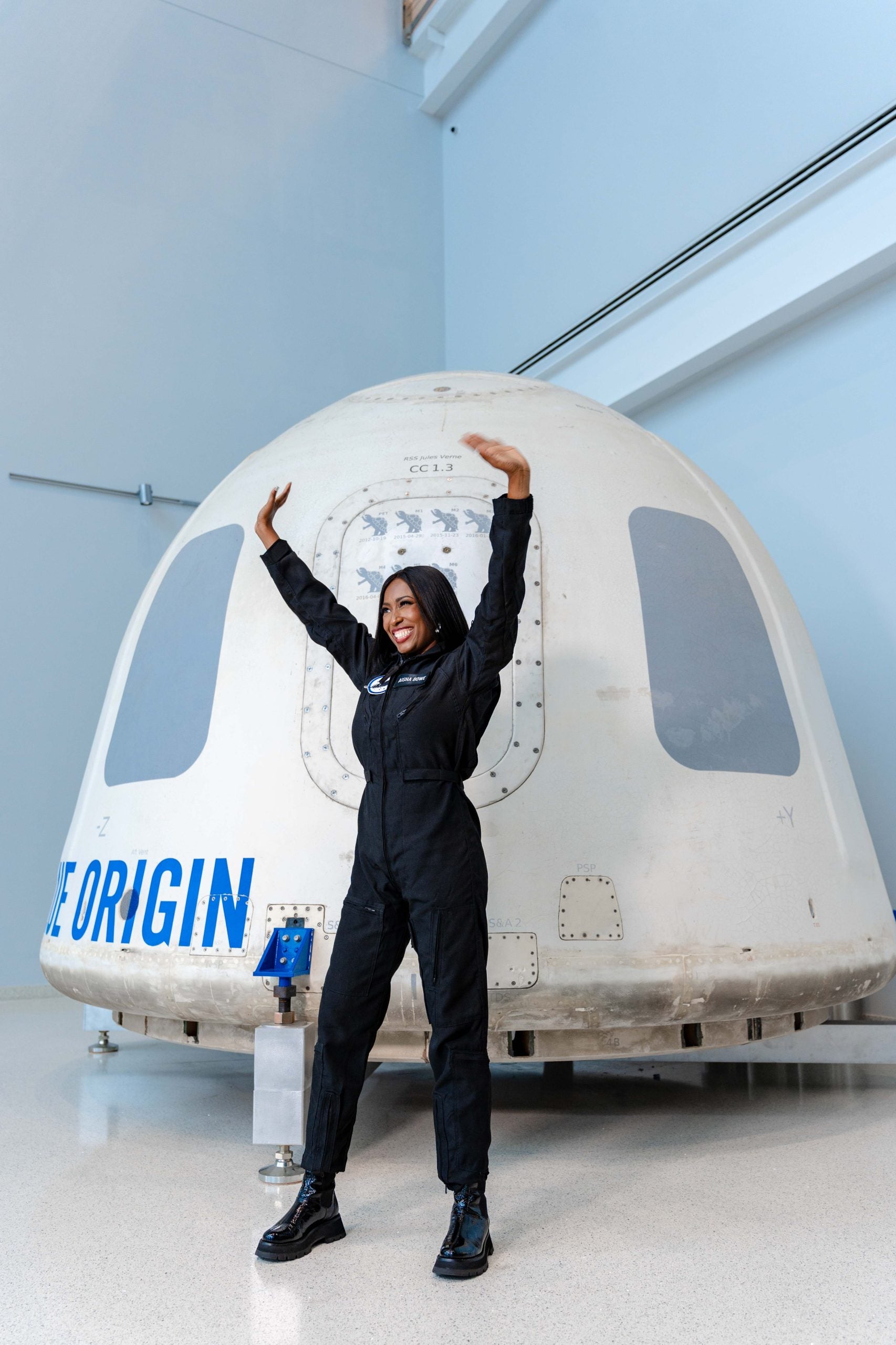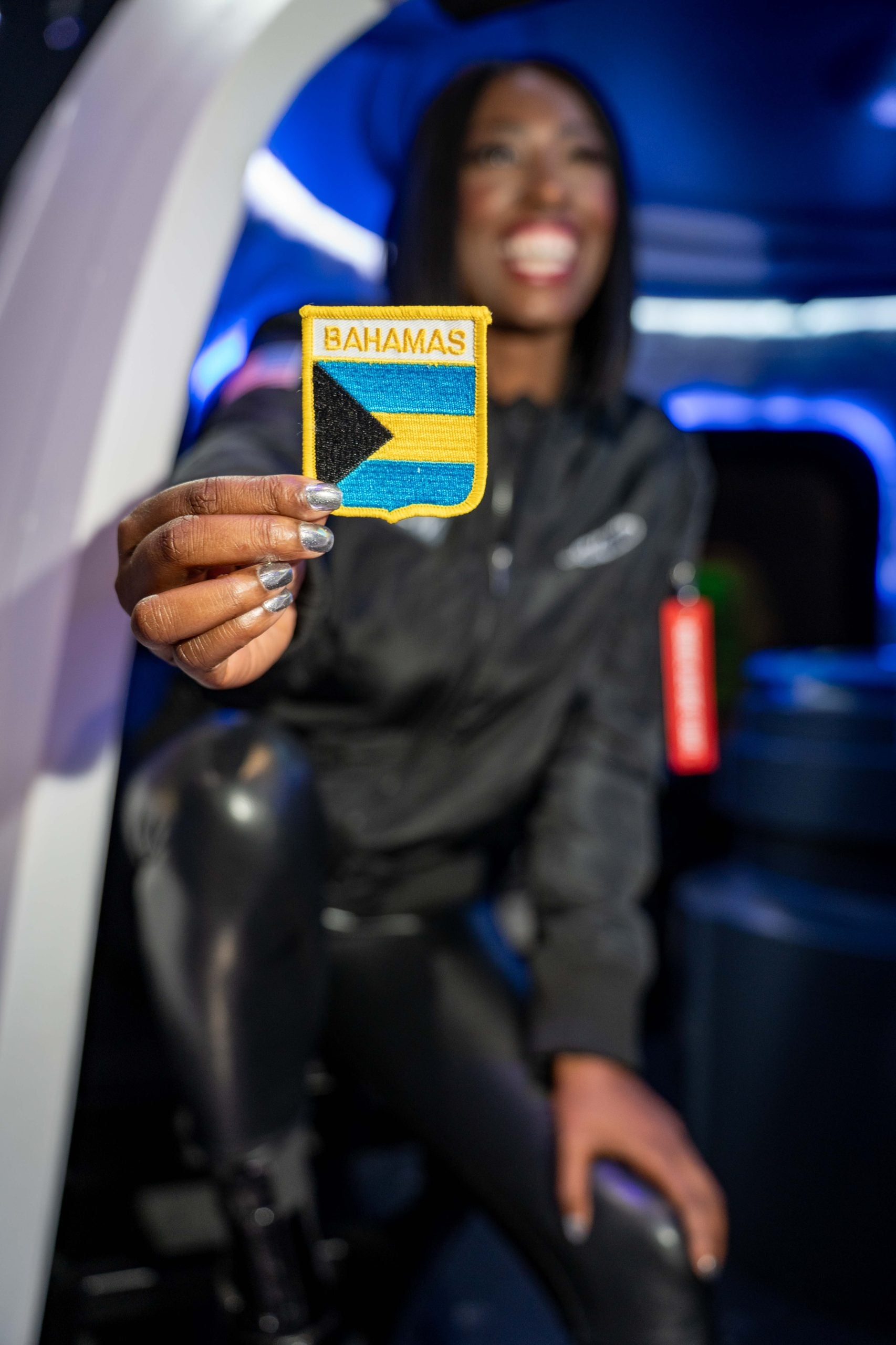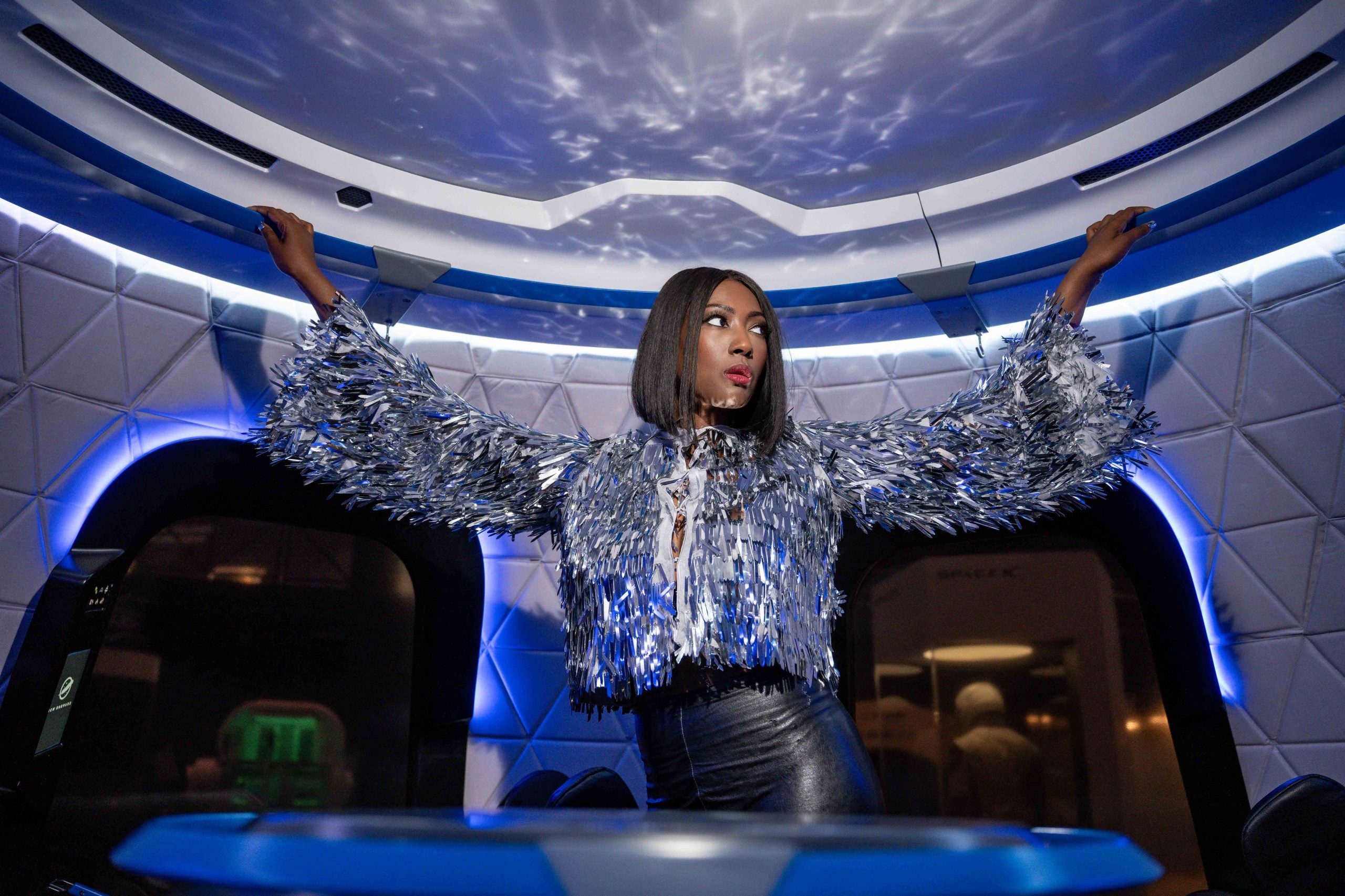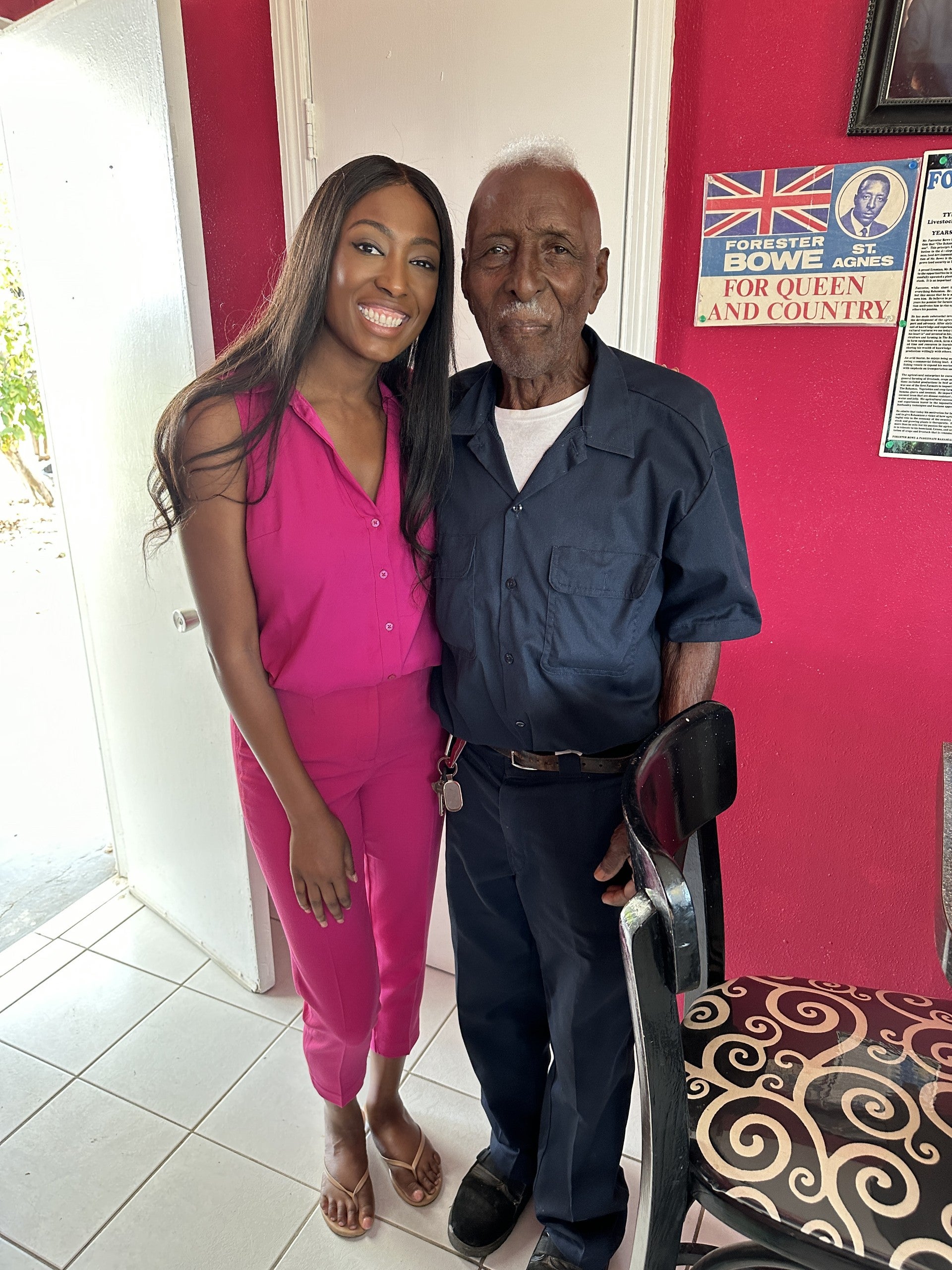
In a world where dreams often remain just that, Aisha Bowe defies expectations. From struggling in high school to becoming a rocket scientist, NASA veteran and now poised to make history as part of the first all-female crew launched by Blue Origin, the space exploration company founded by Jeff Bezos. Bowe’s story is a testament to perseverance, vision and refusing to be placed in a box.
“You have to watch how you speak to yourself, and you have to watch how you allow other people to speak to you,” Bowe tells ESSENCE, recalling her going from a 2.3 GPA high school student to community college and onto earning two aerospace degrees from the University of Michigan and working at NASA for six years.
“Once I decided to say, ‘You know what, I’m going to commit to a reality, a world of my own making. And it doesn’t matter that I struggled in high school. I’m going to focus on doing good in college,’ everything changed.”

Her journey began with a simple yet audacious list of three goals: graduate from university, work in rocket science and earn a position at NASA. What once felt out of reach became reality through unwavering determination and a deep belief in herself—a commitment she describes as dedicating her life to “this idea of the dream.”
Now, as the countdown to April 14 approaches—the day Blue Origin’s rocket is scheduled to blast off—Bowe prepares to make history as the first person of Bahamian heritage to travel to space. She is one of six women selected for this groundbreaking, all-female NS-31 crew, including journalist Gayle King, singer Katy Perry, film producer Kerianne Flynn, research scientist and activist Amanda Nguyen, and journalist and author Lauren Sánchez.
This will be the first all-female crew to launch into space since 1963 when the Soviet Union sent cosmonaut Valentina Tereshkova into orbit by herself. The mission carries special significance for Bowe as she fulfills not only her own dreams but also those of her late father, who once came close to working for NASA himself.
“My dad came to the US to pursue a career in engineering and in science, and he had an opportunity to come close to working for NASA,” Bowe shares. “And it was a dream that I’m not only happy to carry but to be able to take something that I love and to expose it to the world and say, space looks like us too. Space is for all, not for some.”

Her words carry weight in an industry where less than 10 African American women have historically traveled beyond Earth’s atmosphere. “Having had 90% of the world’s astronauts previously be men, and less than 10 are African American women in the history of space. We have to change that,” she emphasizes. “And this is what this mission is going to help to do.”
What makes Bowe stand out isn’t just her scientific accomplishments but her multifaceted approach to breaking barriers.She is partnering with HBCU Winston-Salem State University on microgravity research and creating pathways for future scientists.
“The Astrobotany lab at Winston Salem is top-notch,” Bowe explains. “I wanted to reach back, because we lift as we climb, right? And I want to say I’m going to space. And this is a first. I want to bring you on this journey with me so that we can be covered in all areas. I’m an African American woman who’s a rocket scientist. I want to do research with an HBCU, and then I want to turn around and I want to inspire other people to say they did it. So can I.”
She’s documented her training extensively – from experiencing g-forces in North America’s only human-rated centrifuge to flying fighter jets – sharing these moments online to inspire others. “I want to be able to document this. I want to be able to share the story, and I want to take the community along,” she explains. “It is not a me. It is a we. We are going to space.”
And she does it all while defying stereotypes about how a scientist should look or act. “We are multi-hyphenate,” she says proudly. “Black women, we do not fit in boxes. You can be beautiful, you can be sexy, you can be smart, you can be successful. And that is what I’m excited to show because far too many people think that these fields are not for them at an early age because they perceive them as male-dominated.”
Her space journey will be as stylish as it is scientific. After extensive testing, including high-altitude skydiving in Dubai to ensure her hair and makeup and yes, her lashes stay intact. Bowe plans to blast off with a full beauty look. “I’m going to have a pink suit. I’m going to have a cowboy hat, I’m going to have boots, I’m going to have fringe, and this face is going to be beat, and that is what we’re bringing,” she declares enthusiastically. She’s adamant that STEM and style can coexist: “It is an and. It is not an or.”

Among the items she’ll carry into space are postcards from students worldwide with their written dreams. “What I wanted to do was have students around the world write their dreams, and I’m going to carry them to space, and they’re going to be returned to them because I wanted to bring space home,” Bowe explains. “If your dream has gone to the stars, why can’t you take it there?”
She’ll also carry a symbolic American flag once taken to the moon by astronaut Pete Conrad—his personal flag, now on loan from his wife, Nancy Conrad, and the Museum of Flight in Seattle—representing “the past, present, and future of space.” Alongside it, she’ll bring special items that honor her Bahamian heritage, making this journey not just historic but deeply personal.
Her 92-year-old grandfather will watch his granddaughter soar beyond Earth’s atmosphere. “They didn’t even have airplanes on his island when he grew up, and now he’s going to see me go to space,” Bowe says—a powerful symbol of how far one family and humanity can progress in a single lifetime.
Bowe’s vision extends beyond her own achievements. Earlier this year, she supported the Bahamas in landing the first U.S. rocket on international territory. “We landed a Falcon Nine rocket, and it was the first,” she says proudly. “We’re bringing the multi-billion dollar space industry to the Caribbean.” Her work demonstrates that space exploration is no longer limited to countries with established space programs.

“For me to say that the Bahamas, a country that has entered space without a formal space program, is now sending me to space, I think it’s the dawn of a new age of space and exploration for a lot of places,” Bowe reflects. “You no longer need to come from a country that has a space program to be in space, and you also don’t have to wait for someone else to create a role for you.”
When asked about the inspirational impact of her journey, Bowe doesn’t limit her vision. “People stop me and they’re like, ‘Oh, this must be so inspiring for, you know, Black boys and girls.’ And I’m like, full stop, Black people inspire all people. This is inspiring for everyone,” she says. “I’m getting notes from Kenya, I’m getting notes from India, I’m getting notes from the Caribbean, I’m getting notes from Kentucky. People are inspired, and that is what we are here to do.”
Perhaps most inspiring is Bowe’s approach to failure. The challenges that once seemed insurmountable became the foundation of her success. “If I had not failed, I would not have succeeded,” she reflects. “All the things that I thought were challenges, all the things I thought would crush me really were designed to make me. Now they’re just fun stories I get to tell.”
For those watching her historic flight alongside her crewmates, Bowe hopes to become “a bedtime story” – an inspiration that proves dreams, regardless of how outrageous they might seem, can become reality through perseverance and belief.
“I want the kids to say, ‘Wait, did that? Did that really happen? It seems a little outrageous. Is it true? Did she really manage to become a rocket scientist after almost failing? Did she really go and work for NASA and then found two successful companies? Did she really go to space?’” she shares.
“I’m working in a company that I made up. I’m doing a job that I made up with a logo that I made up, and I get to work in space,” Bowe says with pride. “Dream it, plan it and go do it.”
Blue Origin’s 11th human spaceflight is set to lift off from Launch Site One in West Texas at 10 a.m. EDT. The mission will be live-streamed by Space.com, with coverage courtesy of Blue Origin.
As she prepares to blast off into history, Bowe embodies her own powerful message: “Hold on. Life gets so much better if you dare to dream and if you dare to believe.”







